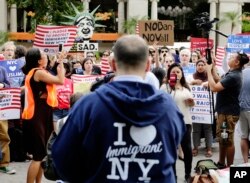The United States is defending its travel ban on six majority-Muslim countries, including restrictions that block grandparents and "extended" relatives of people already in the U.S. from joining them.
The U.S. said in a court filing late Monday that the limitations it imposed on travel from Iran, Libya, Somalia, Sudan, Syria and Yemen were reasonable, based on long-set principles in U.S. immigration law.
The government was responding to a lawsuit brought by the Pacific island state of Hawaii contesting the rules the national government set for the travel ban it implemented last week. The government's imposition of the ban came after the U.S. Supreme Court ruled in late June that President Donald Trump's travel edict could be partially implemented ahead of the court's full hearing on the order later in the year.
The ban prohibits the issuance of new visas from the six countries for 90 days and suspends the refugee resettlement program for 120 days. But the Supreme Court, in its ruling, said the U.S. had to refrain from blocking people from traveling to the U.S. who had a "bona fide relationship" to a person or entity already in the U.S.
That left it up to government immigration officials to decide who could enter the country. The U.S. decided to allow parents, spouses, fiances and children of someone in the U.S. to enter the country, but not grandparents, grandchildren, and a range of other "extended" family members, such as aunts, uncles, nephews, nieces and cousins.
Hawaii is arguing that the government's interpretation of the Supreme Court order is too narrow, while the government said it "hews closely" to legal immigration restrictions set by Congress.
Refugee groups are also contesting the U.S. rules, saying that their work resettling refugees in the country often takes years and qualifies as a "bona fide relationship" with those seeking to enter the country. The refugee groups say these refugees should be exempt from the travel ban.
Meantime, the government's refugee resettlement program is continuing as normal until Thursday, when the 50,000 cap for the year ending in September is expected to be reached.





